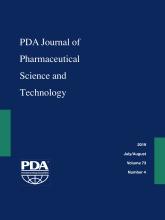Abstract
In the pharmaceutical industry, process validation tasks are based on the raw data and its derived analytical results generated from the process. Process validation failure affects both patient safety and the economic success of the manufacturing company. Hence, data integrity is highly critical in this area. Regulatory agencies, such as the Food and Drug Administration (FDA), reacted to past data integrity breaches by publishing new guidelines on data integrity for the correct handling of data in the pharmaceutical context.
In this contribution, we want to show how data integrity can be improved on a technological level, removing the need for trusted third parties and centralized systems for this task. Therefore, we implemented an approach that uses existing tools, currently mostly used by software developers, and combined them with a new smart contract built on top of the Ethereum blockchain. In a case study, we test how data manipulation or backdating of results can be easily detected and how regulatory agencies can audit the complete data flow from the regulatory report back to the original raw data.
The results of this contribution outline a possible road map for the development of production-ready tools, such as versioned database systems that natively interoperate with distributed ledgers. This will improve the trustworthiness of pharmaceutical manufacturing data by both protecting the intellectual property of the industrial company and improving the safety of the patients.
LAY ABSTRACT: In the pharmaceutical industry, economically driven manufacturing companies are regulated and controlled by regulatory agencies. The pharmaceutical manufacturing companies need to produce large amounts of process and analytical data to show that their products are safe for patients. As the decisions of the regulatory agencies rely on this data, manufacturing companies need to prove how their generated data can be protected from technical breaches or data manipulation.
As of today, the available technical solutions to provide data integrity are not working well enough. Regulatory agencies have published multiple documents highlighting the current data integrity issues.
In this contribution, we show how blockchain, a technology that multiple cryptocurrencies like Bitcoin rely on, can help to improve the integrity of manufacturing data and data science analysis procedures. Therefore, we combined a smart contract on the Ethereum blockchain with tools currently mostly used by software developers. The presented workflow shows how data integrity can be guaranteed on a technological level without the need for trusted third parties.
- © PDA, Inc. 2019
PDA members receive access to all articles published in the current year and previous volume year. Institutional subscribers received access to all content. Log in below to receive access to this article if you are either of these.
If you are neither or you are a PDA member trying to access an article outside of your membership license, then you must purchase access to this article (below). If you do not have a username or password for JPST, you will be required to create an account prior to purchasing.
Full issue PDFs are for PDA members only.
Note to pda.org users
The PDA and PDA bookstore websites (www.pda.org and www.pda.org/bookstore) are separate websites from the PDA JPST website. When you first join PDA, your initial UserID and Password are sent to HighWirePress to create your PDA JPST account. Subsequent UserrID and Password changes required at the PDA websites will not pass on to PDA JPST and vice versa. If you forget your PDA JPST UserID and/or Password, you can request help to retrieve UserID and reset Password below.






